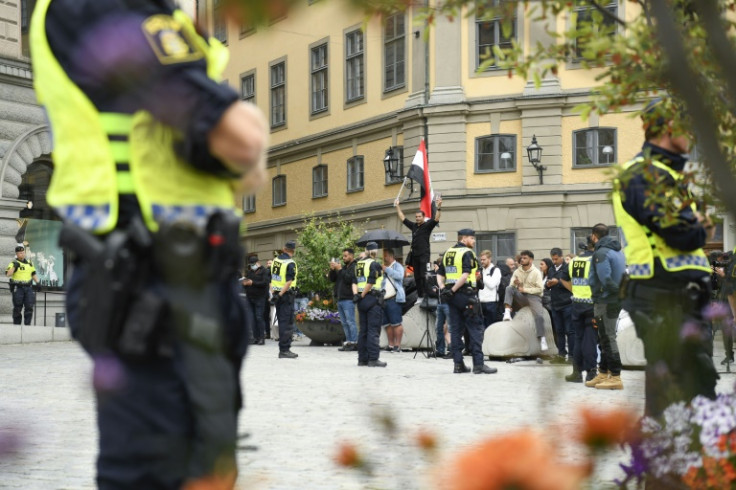Koran set alight at protest outside Sweden parliament
Two men set the Koran alight outside parliament in Stockholm on Monday, an AFP reporter saw, at a protest similar to previous ones that have sparked tensions between Sweden and Muslim nations.

Two men set the Koran alight outside parliament in Stockholm on Monday, an AFP reporter saw, at a protest similar to previous ones that have sparked tensions between Sweden and Muslim nations.
Salwan Momika and Salwan Najem stomped on the Muslim holy book, set its pages ablaze before slamming it shut, as they did at a protest outside Stockholm's main mosque in June -- sparking outrage across the Middle East.
The duo also staged a similar protest outside Iraq's embassy in Stockholm on July 20, where they stomped on the religious text but did not burn it.
Swedish police granted a permit for the protest by campaigners hoping to see the Koran banned in the country.
"I want to protest in front in front of Sweden's parliament and demand that the Koran be banned," organiser Najem wrote in the application, which has been viewed by AFP, adding that he would "burn the Koran there."
As at earlier protests, Momika and Najem were the only participants, with a small group of counter-protesters gathering outside the police cordon, according to an AFP reporter at the scene.
Around a dozen counter-protesters held up copies of the Koran, with some waving Iraqi flags, and shouted at Momika, who just as at earlier events wore sunglasses and grinned defiantly while taunting them.
Mats Eriksson, a spokesman for Stockholm police, told AFP the event "had been conducted without any serious public order disturbances".
During the protest Momika also stomped on a picture of Shiite Muslim cleric and political leader Moqtada Sadr -- whose followers had stormed Sweden's embassy in Baghdad in response to previous desecrations. They had started fires within the compound the night before the July protest.
The Iraqi prime minister and president "vehemently condemned the repeated acts of desecration" of the Koran.
They called on the countries where the attacks took place to take a "firmer position and put an end to these criminal practices".
"We saw him standing there again and yelling stuff about the Koran and about Islam, playing with the Koran, and honestly it's all for attention and it's pretty obvious," Tamazight El Yaakoubi, an 18-year-old law student from the Netherlands, told AFP.
"Before we came here we were pretty scared, we were like, 'Koran burned down, why?'" added the Muslim visitor.
"But when we came here almost everyone is full of love and everyone is very respectful."
Sweden has already seen its diplomatic relations with several Middle Eastern nations strained over previous protests involving Koran desecrations.
Swedish police have previously stressed they only grant permits for people to hold public gatherings and not for the activities conducted during the events.
Both previous protests have led to widespread outrage and condemnations.
The Organisation of Islamic Cooperation on Monday met to address Koran desecrations and voiced "disappointment" with Sweden and Denmark's response.
Secretary-general Hissein Brahim Taha called on both countries to prevent Koran desecration and "expressed his disappointment that no measures were taken in this regard so far", the 57-member, Jeddah-based body said.
"It is unfortunate that the concerned authorities claiming freedom of expression continue to provide licences to repeat these acts contrary to international law, and this leads to a lack of respect for religions," Taha said.
Before the meeting Swedish Foreign Minister Tobias Billstrom said he had been in contact with several of his counterparts among member states and sent a letter to all members.
In a statement, Billstrom said he had informed them about the process for granting permits for public gatherings in Sweden and that police made such decisions independently.
Billstrom said he had stressed "the Swedish Government has been very clear in its rejection of the Islamophobic acts carried out by individuals at demonstrations in Sweden".
Turkish President Recep Tayyip Erdogan, whose support is crucial for Sweden's bid to join the NATO defence alliance, has expressed deep anger at the Koran burnings.
The Nordic country abandoned centuries of military non-alignment and decided to apply for NATO membership in the wake of Russia's invasion of Ukraine.
Last week, Sweden ordered 15 government bodies including the armed forces, several law enforcement agencies and the tax office to strengthen anti-terrorism efforts.
On Sunday, neighbouring Denmark said it would explore legal means of stopping protests involving the burning of holy texts, citing security concerns following a backlash over Koran desecrations.
Swedish Prime Minister Ulf Kristersson said a similar process was already under way, while noting his country was in "the most serious security situation since World War II."
"Here at home we know that states, state-like actors and individuals can take advantage of the situation," Kristersson said in a post to Instagram.
Swedish and Danish envoys have been summoned in a slew of Middle Eastern nations.
© Copyright AFP 2025. All rights reserved.





















